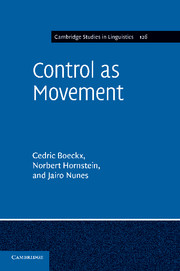Book contents
- Frontmatter
- Contents
- Acknowledgments
- 1 Introduction
- 2 Some historical background
- 3 Basic properties of the movement theory of control
- 4 Empirical advantages
- 5 Empirical challenges and solutions
- 6 On non-obligatory control
- 7 Some notes on semantic approaches to control
- 8 The movement theory of control and the minimalist program
- References
- Index
4 - Empirical advantages
Published online by Cambridge University Press: 07 September 2010
- Frontmatter
- Contents
- Acknowledgments
- 1 Introduction
- 2 Some historical background
- 3 Basic properties of the movement theory of control
- 4 Empirical advantages
- 5 Empirical challenges and solutions
- 6 On non-obligatory control
- 7 Some notes on semantic approaches to control
- 8 The movement theory of control and the minimalist program
- References
- Index
Summary
Introduction
In this chapter we explore some empirical consequences of (our version of) the MTC. We start by discussing the welcome results one obtains by assuming that OC PRO is a trace of A-movement, regardless of the view on traces one takes. We will see that OC PRO and standard A-traces pattern alike in being invisible to some morphological computations (section 4.2), being transparent for interclausal agreement (section 4.3), and being allowed in the subject position of finite clauses when the finite T is not an obligatory case assigner/checker (section 4.4). Next, we discuss empirical consequences of the MTC when the copy theory of movement is taken into consideration. In particular, we will discuss cases where an OC PRO behaves like an overt element in being subject to morphological restrictions (section 4.5.2), cases where OC PROs are phonetically realized (see section 4.5.3 on backward control and section 4.5.4 on copy control), and cases where OC PROs are traces of sideward movement, i.e., movement from one tree to another independent tree (see section 4.5.1 on adjunct control). Finally, section 4.6 presents our conclusion that the data covered by the MTC discussed in this chapter prove fatal for any PRO-based account of OC.
Morphological invisibility
It has long been observed that PRO differs from A'-traces in not blocking sandhi phenomena, the most well-known example of such being wanna-contraction in English, as illustrated in (1) and (2).
- Type
- Chapter
- Information
- Control as Movement , pp. 59 - 124Publisher: Cambridge University PressPrint publication year: 2010



